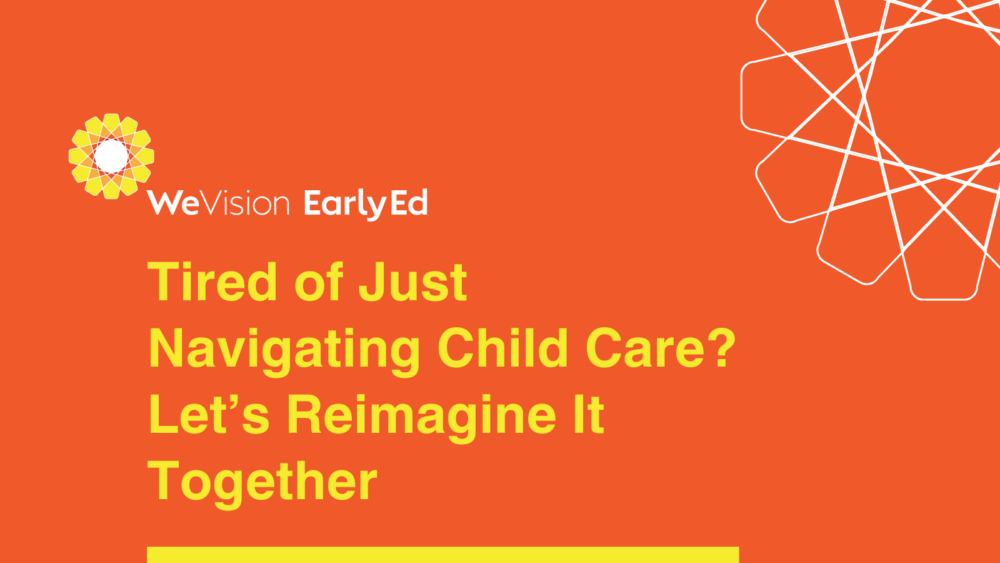Like many of you, our partners operating early childhood education programs are navigating the many pain points of the child care system. They continue to find innovative ways to balance quality, accessibility, and affordability with limited and inconsistent funding while accepting that “it is what it is” if they want to serve young children and their families. Our advocacy and research partners also do the same. They highlight persistent pain points and squeeze what they can from outdated policies. As a funder, we have also done the same. We have spent the bulk of our funding supporting partners so they can navigate a broken system.
While this level of collective resilience is commendable and can have a positive impact on young children and families, our partners (practitioners and advocates alike) continue to tell us that just navigating is unsustainable. It is harmful to those closest to the child care system, holds the status quo in place, and does not shift or push the system to change. It does not allow young children and families to thrive.
And when our partners speak, we listen and act. This is why we launched WeVision EarlyEd in November 2022.
The WeVision EarlyEd initiative provides the time and space for “proximity experts,” early childhood professionals and families closest to the child care system, to reimagine child care. It challenges outdated mindsets. It moves us from “it is what it is” to “what it should be.” It allows us to imagine the future, and then work together to make the ideal real. In this WeVision EarlyEd space, we are all making a shared commitment to do a bit more reimagining and questioning, even as we continue navigating to survive.
Here are three things we have learned from proximity experts so far:
1. Families and early childhood professionals all have similar journeys, pain points, and aspirations. They want a child care system that is child-centered and quality-centered so young children, and those who care for them, can thrive.

2. In order to fundamentally transform the child care system, we need to challenge our assumptions about what child care is, who is served, who pays, how we define quality, and how decisions are made. We need to shift our mindsets and the way we advocate and talk about child care.
One example of shifting mindsets is how we describe child care options, which can be confusing for both families and early childhood professionals. We use a myriad of labels and it’s not always clear what services are being delivered or what families can expect — family child care, daycare, home provider, preschool, licensed program, unlicensed program, prekindergarten, child development program, kith and kin, elementary school, friend, family, neighbor care (FFN) — just to name a few. Some of these settings and labels are wrongly perceived as “better” than others.We created a traveling WeVision EarlyEd conference exhibit to begin to test these shifts and collect data directly from early childhood professionals across the country.
Here is how roughly 700 early childhood professionals attending a national and a local early childhood conference saw themselves in a future with clear and well-funded child care options.
Note how these options use consistent language to focus less on the building type. Instead, they focus on the scope of services families should expect to receive from practitioners and strengthen the case for equitable funding across options.
Data from a Local Early Childhood Education Conference in Florida

Data from a National Early Childhood Education Conference Supporting Family Child Care

3. The ideal child care system, as defined by proximity experts, can be made real, even as we navigate the ongoing pain points.
- WeVision EarlyEd is beginning to fund and support a cohort of Solutions Lab sites so they can make all components of the ideal child care system real…right now. Here is what this looks like. At a minimum, participating sites must:
- Meet the industry-recognized and holistic quality standards for early childhood education programs of their choice as a baseline.
- Document their impact on child growth and learning.
- Define an annual cost per child, based on what it really costs to run a quality-centered and child-centered program.
- Compensate early childhood educators, using public school wages as a guide, and intentionally support the well-being of early childhood educators.
- Support affordability for families who are eligible for publicly subsidized child care as well as those who aren’t.
So, if you are tired of just navigating child care, please join us as we reimagine child care together. You will have opportunities to add to the conversation, share your expertise, host WeVision EarlyEd workshops in your community, co-fund Solution Lab work, deepen your advocacy, learn alongside others, self-reflect, and more.
We’ll be sharing updates monthly through this blog and on social media. To learn more, visit Get Involved – WeVision EarlyEd. Make sure to sign up for updates that will keep us connected.

